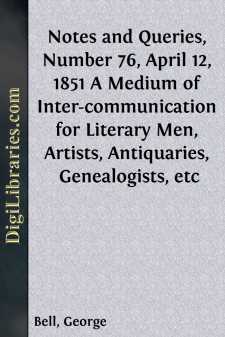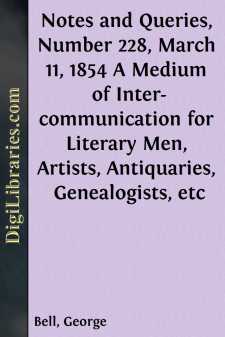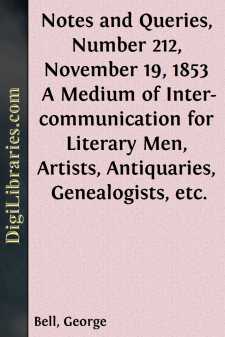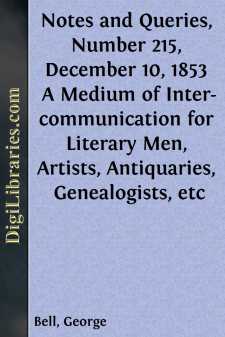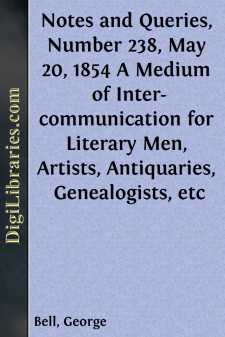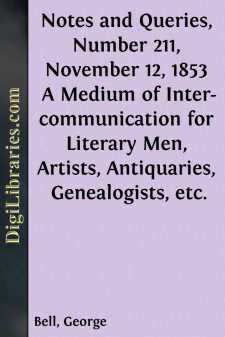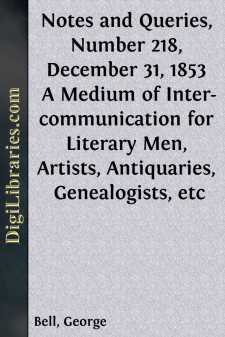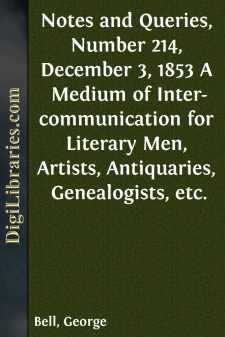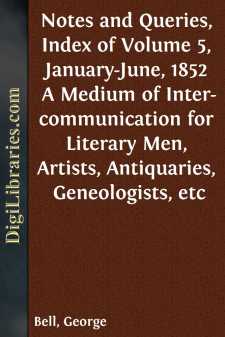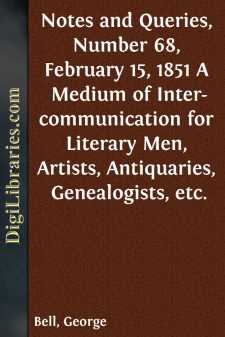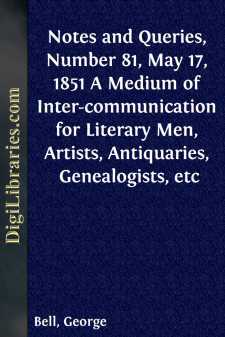Categories
- Antiques & Collectibles 13
- Architecture 36
- Art 48
- Bibles 22
- Biography & Autobiography 813
- Body, Mind & Spirit 142
- Business & Economics 28
- Children's Books 17
- Children's Fiction 14
- Computers 4
- Cooking 94
- Crafts & Hobbies 4
- Drama 346
- Education 46
- Family & Relationships 57
- Fiction 11829
- Games 19
- Gardening 17
- Health & Fitness 34
- History 1377
- House & Home 1
- Humor 147
- Juvenile Fiction 1873
- Juvenile Nonfiction 202
- Language Arts & Disciplines 88
- Law 16
- Literary Collections 686
- Literary Criticism 179
- Mathematics 13
- Medical 41
- Music 40
- Nature 179
- Non-Classifiable 1768
- Performing Arts 7
- Periodicals 1453
- Philosophy 64
- Photography 2
- Poetry 896
- Political Science 203
- Psychology 42
- Reference 154
- Religion 513
- Science 126
- Self-Help 84
- Social Science 81
- Sports & Recreation 34
- Study Aids 3
- Technology & Engineering 59
- Transportation 23
- Travel 463
- True Crime 29
Notes and Queries, Number 76, April 12, 1851 A Medium of Inter-communication for Literary Men, Artists, Antiquaries, Genealogists, etc
by: George Bell
Categories:
Description:
Excerpt
To judge of this question fairly, it will be necessary to cite the passage in which it occurs, as it stands in the folio, Act III. Sc. 8., somewhat at large.
"Eno. Naught, naught, all naught! I can behold no longer;
Th' Antoniad, the Egyptian admiral,
With all their sixty, fly, and turn the rudder;
To see't, mine eyes are blasted.
Enter Scarus.
Scar. Gods and goddesses, all the whole synod of them!
Eno. What's the passion?
Scar. The greater cantle of the world is lost
With very ignorance; we have kiss'd away
Kingdoms and provinces.
Eno. How appears the fight?
Scar. On our side like the token'd pestilence,
Where death is sure. Yond ribaudred Nagge of Egypt,
Whom leprosy o'ertake, i' the midst o' the fight
When vantage like a pair of twins appear'd,
Both as the same, or rather ours the elder,
The Breeze upon her, like a cow in June,
Hoists sail and flies.
Eno. That I beheld:
Mine eyes did sicken at the sight, and could not
Endure a further view.
Scar. She once being loof'd,
The noble ruin of her magick, Antony,
Claps on his sea-wing, and, like a doting mallard,
Leaving the fight in height, flies after her;
I never saw an action of such shame;
Experience, manhood, honour, ne'er before
Did violate so itself.
Eno. Alack, alack!"
The notes in the variorum edition begin by one from Johnson, in which he says:
"The word is in the old edition ribaudred, which I do not understand, but mention it in hopes that others may raise some happy conjecture."
Then Steevens, after having told us that a ribald is a lewd fellow, says:
"Ribaudred, the old reading, is I believe no more than a corruption. Shakspeare, who is not always very nice about his versification, might have written,
'Yon ribald-rid nag of Egypt'—
i.e. Yon strumpet, who is common to every wanton fellow."
Malone approves Steevens's ribald-rid, but adds,
"By ribald, Scarus, I think, means the lewd Antony in particular, not every lewd fellow."
Tyrwhitt saw the necessity of reading hag instead of nag, and says what follows seems to prove it:
"She once being loof'd,
The noble ruin of her magick, Antony,
Claps on his sea-wing."
It is obvious that the poet would not have made Scarus speak of Antony as the noble ruin of Cleopatra's magick, and of his manhood and honour, and in the same breath designate him as a ribald. He would be much more likely to apply the epithet lewd hag to such an enchantress as Cleopatra, than that of ribald-rid nag, which I feel convinced never entered the imagination of the poet.
Imperfect acquaintance with our older language has been too frequently the weak point of the commentators; and we see here our eminent lexicographer confessing his ignorance of a word which the dictionaries of the poet's age would have enabled him readily to explain. For although we have not the participle ribaudred, which may be peculiar to the poet, in Baret's Alvearie we find "Ribaudrie, vilanie in actes or wordes, filthiness, uncleanness"—"A ribaudrous and filthie tongue, os obscœnum et impudicum:" in Minsheu, ribaudrie and ribauldrie, which is the prevailing orthography of the word, and indicates its sound and derivation from the French, rather than from the Italian ribalderia....


